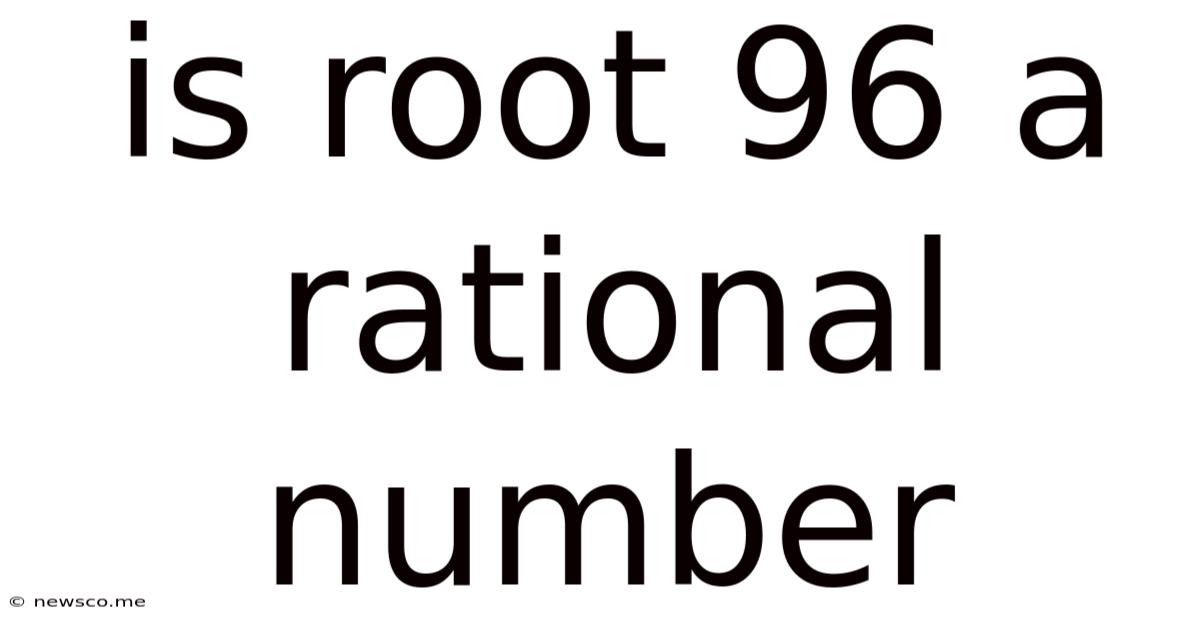Is Root 96 A Rational Number
News Co
Apr 02, 2025 · 4 min read

Table of Contents
Is √96 a Rational Number? A Deep Dive into Irrationality
The question of whether √96 is a rational number is a fundamental one in mathematics, touching upon the core concepts of rational and irrational numbers. Understanding this requires a solid grasp of number theory and the properties of square roots. Let's delve into this question thoroughly, exploring the definitions, methods of determining rationality, and ultimately answering the question definitively.
Understanding Rational and Irrational Numbers
Before we tackle √96, let's define our terms.
Rational Numbers: A rational number is any number that can be expressed as a fraction p/q, where p and q are integers, and q is not equal to zero. Examples include 1/2, 3, -4/7, and 0. These numbers can be represented as terminating or repeating decimals.
Irrational Numbers: An irrational number is any number that cannot be expressed as a fraction p/q, where p and q are integers, and q is not zero. These numbers have decimal representations that are non-terminating and non-repeating. Famous examples include π (pi) and e (Euler's number). The square roots of non-perfect squares are also irrational.
Exploring the Square Root of 96
Now, let's examine √96. To determine if it's rational or irrational, we need to attempt to express it as a fraction of two integers. The first step is to simplify the square root.
Simplifying √96
We can simplify √96 by finding its prime factorization.
96 = 2 x 48 = 2 x 2 x 24 = 2 x 2 x 2 x 12 = 2 x 2 x 2 x 2 x 6 = 2 x 2 x 2 x 2 x 2 x 3 = 2<sup>5</sup> x 3
Therefore, √96 = √(2<sup>5</sup> x 3) = √(2<sup>4</sup> x 2 x 3) = √(2<sup>4</sup>) x √(2 x 3) = 2<sup>2</sup>√6 = 4√6
This simplification reveals that √96 is equal to 4 multiplied by the square root of 6.
Is √6 Rational?
The crucial question now becomes: is √6 a rational number? Let's assume, for the sake of contradiction, that √6 is rational. This means it can be expressed as a fraction p/q, where p and q are integers, and q ≠ 0, and the fraction is in its simplest form (meaning p and q share no common factors other than 1).
If √6 = p/q, then squaring both sides gives us:
6 = p²/q²
This implies:
6q² = p²
This equation tells us that p² is an even number (because it's a multiple of 6). If p² is even, then p must also be even (the square of an odd number is always odd). Since p is even, we can express it as 2k, where k is an integer.
Substituting p = 2k into the equation 6q² = p², we get:
6q² = (2k)² = 4k²
Dividing both sides by 2:
3q² = 2k²
This equation shows that 2k² is divisible by 3, which means 2k² is a multiple of 3. This implies that k² must be divisible by 3 (since 2 is not divisible by 3), and therefore k itself must be divisible by 3. We can express k as 3m, where m is an integer.
Substituting k = 3m into 3q² = 2k², we get:
3q² = 2(3m)² = 18m²
Dividing both sides by 3:
q² = 6m²
This shows that q² is also an even number, and therefore q must be even.
We've reached a contradiction. We initially assumed that p/q was in its simplest form (no common factors). However, we've shown that both p and q are even, meaning they share a common factor of 2. This contradiction proves our initial assumption that √6 is rational must be false.
Therefore, √6 is irrational.
Conclusion: √96 is Irrational
Since √96 simplifies to 4√6, and we've proven that √6 is irrational, it follows that √96 is also irrational. Multiplying an irrational number (√6) by a rational number (4) does not change its irrationality. The product remains irrational.
The key takeaway is that the square roots of non-perfect squares are always irrational. 96 is not a perfect square; therefore, its square root is irrational. This understanding is critical for various mathematical applications and demonstrates the fundamental differences between rational and irrational numbers. The proof by contradiction elegantly highlights the inherent properties of irrational numbers and their inexpressible nature as simple fractions. This deep dive shows the power of mathematical reasoning and helps solidify the understanding of number systems. The method used, proof by contradiction, is a powerful tool in many mathematical proofs and showcases the elegance of mathematical logic. Remember, the properties of rational and irrational numbers are foundational to higher-level mathematics and critical for a comprehensive understanding of numerical systems.
Latest Posts
Related Post
Thank you for visiting our website which covers about Is Root 96 A Rational Number . We hope the information provided has been useful to you. Feel free to contact us if you have any questions or need further assistance. See you next time and don't miss to bookmark.